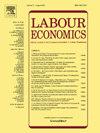The effect of area-level waiting times for psychological therapies on individual-level labour market outcomes
IF 2.6
2区 经济学
Q2 ECONOMICS
引用次数: 0
Abstract
The association between common mental health conditions, including anxiety and depression, and labour outcomes has been extensively documented. However, the consequences of delaying access to therapies addressing these conditions is unknown. The NHS Talking Therapies programme was launched in England in 2008 and had expanded to reach 1.24 million users by 2021. We investigate the reduced-form impact of delayed access to this programme on the gap in probability of employment and taking time away from work attributable to poor mental health. We measure mental health and labour outcomes using 2015-2019 data from the UK Household Longitudinal Study. As this does not record use of Talking Therapies, we use poor mental health to proxy capacity to benefit and identify the intent-to-treat effect. A one standard deviation (10.5 days) decrease in median area-level waiting time leads to a 1.5 percentage point decrease in the gap in probability of employment between individuals in good and poor mental health. Similarly, the gap in the probability of taking time away from work decreases by around 1 percentage point. Our findings are robust to alternative model specifications, sample definitions, treatment definitions, and dealing with potential selective attrition. Our reduced form estimates suggest that faster access to effective treatment can improve labour market outcomes and reduce the productivity losses associated with mental health problems.
区域层面心理治疗等待时间对个人层面劳动力市场结果的影响
包括焦虑和抑郁在内的常见心理健康状况与分娩结果之间的关联已得到广泛记录。然而,延迟获得治疗这些疾病的后果尚不清楚。NHS谈话疗法项目于2008年在英格兰启动,到2021年已扩大到124万用户。我们调查了由于心理健康状况不佳而延迟获得该计划对就业概率差距和请假的影响。我们使用英国家庭纵向研究的2015-2019年数据来衡量心理健康和劳动结果。由于这并没有记录谈话疗法的使用情况,我们用不良的心理健康状况来代表获益的能力,并确定治疗意图的效果。区域一级等待时间中位数每减少一个标准差(10.5天),心理健康状况良好和心理健康状况不佳的个人就业概率差距就会缩小1.5个百分点。同样,从工作中抽出时间的概率差距减少了大约1个百分点。我们的发现是稳健的替代模型规范,样本定义,处理定义,并处理潜在的选择性损耗。我们的简化形式估计表明,更快地获得有效治疗可以改善劳动力市场结果,减少与精神健康问题相关的生产力损失。
本文章由计算机程序翻译,如有差异,请以英文原文为准。
求助全文
约1分钟内获得全文
求助全文
来源期刊

Labour Economics
ECONOMICS-
CiteScore
3.60
自引率
8.30%
发文量
142
期刊介绍:
Labour Economics is devoted to publishing research in the field of labour economics both on the microeconomic and on the macroeconomic level, in a balanced mix of theory, empirical testing and policy applications. It gives due recognition to analysis and explanation of institutional arrangements of national labour markets and the impact of these institutions on labour market outcomes.
 求助内容:
求助内容: 应助结果提醒方式:
应助结果提醒方式:


